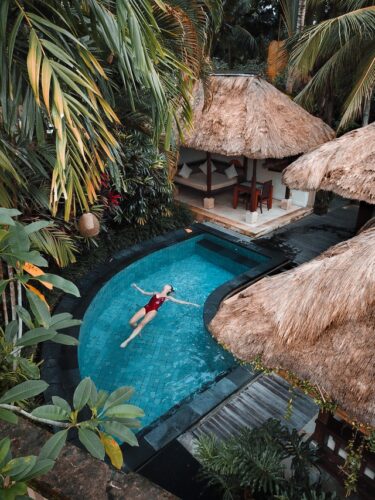I admit it. The title of this article is clickbait-ish. Because there are actually dozens of reasons why you would want solar power!
But as you’ll see in a few paragraphs, I’m also going to give you five reasons why you might not want solar power – and maybe save you a few thousand dollars in the process.
By the way, the original title for this article was actually “RV Solar Power: Is It Worth It?” And if that’s the question you should file it away for quick reference in your cranium. Because that’s the Big Question I’m trying to answer: When do you want solar power, and when might you not?
How Do RV Solar Panels Work?
If you’re a solar power newbie, here’s the Spark Notes introduction: An RV solar system is actually more simple than you might think, and consists of three main components. Solar panels capture the sun’s energy, batteries store the power, and a charge controller prevents your batteries from overcharging. Wires connect the components.
A common addition to these three components is an inverter to convert DC power into AC power, allowing you to run many common appliances such as a blender, a television, or a blender. Did I mention blender twice? Hey, everyone knows that for an RVer, happy hour is 24/7!
Psst … inverters ain’t cheap. Check out this article all about inverters: how to pick the correct size, best brands, best portable inverters, etc.
Is RV Solar Power Worth It … Compared to What?
The question “Is solar power worth it?” presupposes alternatives. If you don’t invest in solar power, what are your other options?
Well, there’s really only one: a generator. A generator is a machine, mostly an engine, that burns gasoline or propane fuel. The rotation of the engine drives an alternator that creates electricity.
The hidden “option” is to do absolutely nothing. RVs existed for a hundred years without portable solar power. As you’ll read below, you might have no reason to hop on this bandwagon.
If you’re totally new to the RV world, you might be wondering, “What’s all this hullabaloo anyway? Why are we even talking about this?”
Except for motorhomes, RVs can’t generate their own power (and motorhomes can only generate a limited amount). If you want power, you must plug in. No outlet nearby? You’re SOL.
Solar power cuts this electrical ball and chain. With solar panels, you harvest electricity from the sun. You can camp wherever you want. With a 220-Ah battery bank and 400-watt solar panel system, the average RV owner can dry camp comfortably 3-5 days.
5 Reasons Why Your RV Doesn’t Need Solar Power
Let’s play devil’s advocate. We all know solar power is affordable, eco-friendly, renewable, accessible, and portable. So why would you not want it?
1. You Like the Resort Life

Hey, if you define camping as free Wifi, a community pool, and a game room open to 10:00 p.m., who’s to say otherwise?
If you don’t often find yourself more than 30 feet from a power pedestal, then you likely don’t need solar power. On-demand electricity from the grid is cheap. Capturing your own is not. You will not likely recoup your initial investment.
2. Your RV Is Your Daily Driver
If you drive a Class B motorhome or conversion van, then you may – or may not – discover that solar power is overkill.
When you drive your motorhome, the engine powers an alternator that charges both your motor (starter) and RV (house) batteries. It doesn’t take more than a few miles to top off your batteries.
If you drive your RV daily, you may find that commutes and errands are sufficient to charge your house batteries.
On the other hand, many Class B’s and conversion vans are used not only as daily drivers but also as domiciles. And residential appliances, like coffee makers and hair dryers, drain a battery fast! You might require solar power or a generator to supplement your power requirements.
3. You Want Power and You Want It Now
Solar power requires patience. Panels won’t generate prodigious power instantly, and batteries don’t like being quickly discharged.
Air conditioners, microwaves, and other AC appliances consume vast amounts of power. Unless you spend $5,000+ in energy storage equipment, a solar power system will not be capable of operating your high-energy appliances.
In this situation, your best (and only) choice is a generator, preferably an inverter generator. I wrote an entire article about inverter generators here.
4. You Need the Cheapest Power Supply

I get it. Not everyone who uses an RV retired at 52 to become a martini-sipping nomad. If you need the lowest $/kW, then you might be disappointed by solar power. Even though the cost of solar panels has plummeted in recent years, fossil fuels are still cheaper.
Generally, operating 2-way or 3-way appliances off propane is more cost-effective than using electricity. In most RVs, this means running your furnace, water heater, and refrigerator off propane.
You might think that a generator is always cheaper than solar power, but you would be incorrect. Generators become cost-effective as the power demands increase. In other words, running a high-energy appliance, like an air conditioner, off a generator is probably your most cost-effective option. But you’d be flushing – er, combusting – money away if you turned on a generator just to charge your smartphone.
5 You Hate Technology (and Arithmetic)
Solar power has a certain amount of techie sex appeal. If you’re not at least slightly aroused by the relationship between watts and amps and whether an MPPT controller beats a PWM controller, then solar power might not be for you.
I admit – this isn’t exactly a scientific observation. But in my experience, people who can’t figure out how to install a doorknob (who know who you are) tend to become petulant and discombobulated around solar power systems.
Unless you pay a technician to specify and install your entire system, you’ll need to do some legwork. If you’re unwilling or unable to pay for expert assistance and maintenance, then you might be better off with a generator, which is about as complicated to operate as a lawnmower.
Solar: What Is It Good For? (Absolutely Everything!)
- When you’re off-grid and can’t rely on shore power, solar keeps things going.
- It is low-maintenance and noise-free.
- Solar power frees you from the ties of the traditional RV campground.
- Solar is also great for both the environment and your bank account. After the initial start-up cost, you have an unlimited source of free power at your disposal.
Since 2000 to 2021, the price per solar panel watt has dropped from $3.50 to $1.42, and there’s a solar installation company around every corner. Lithium batteries have also greatly enhanced the experience. Though more expensive than other options, a lithium battery is safer, lasts longer, and can store more power.
What Can’t Solar Power Do?
For starters, you’ll want to squash those dreams about running your air conditioner off of solar power. Solar helps, but battery capacity is limited, making it a less than ideal solution for power-hungry appliances like refrigerators, microwaves, coffee makers, or air conditioning.
Actually, there are two restrictions: energy capacity and discharge rate.
- Energy capacity: the total amount of available energy in your storage batteries
- Discharge rate: the maximum rate of electrical discharge from your battery bank
Energy capacity is measured in amp-hours (Ah). I explain everything there is to know about energy capacity and other battery geek stuff in my article series on RV batteries.
Discharge rate is a little more challenging to wrap your brain around. If you attempt to drain a battery of all its energy in, say, 5 minutes, you’ll permanently damage or even break the batteries. Typically, lead-acid batteries should be discharged at faster than C1, which is to say available energy capacity/one hour.
I’ll save you the mental abacus. Basically, batteries are best for low n’ slow electrical loads. Appliances that have large inrush current or high amperage demands (e.g. anything with a motor, anything that makes heat) work best off a generator.
Can You Use Only Solar Power?
Solar power is reliant on the availability of sunlight, so bad weather can make things problematic.
Solar panels deliver voltage when exposed to sunlight. Direct, powerful sunlight leads to maximum voltage. Angled, dusky sunlight leads to less voltage – or nothing at all!
That means that weather, season, and panel angle affect how much power your system will deliver. Winter sunlight isn’t as powerful as summer sunlight. Clouds, smog, or even dust on the panel can significantly reduce power generation.
In many cases, you’ll still want a generator to ensure you’re never left without power.
How Many Solar Panels Do You Need For an RV?
If you use your appliances a lot, you’re going to need more panels. If you’re off-grid more often than not, you’re also going to want more panels.
How many panels? Or more accurately, how many watts?
I could drag you through the math, but let’s keep it simple.
- 100-200 watts: Tops off batteries, good for 1-2 days.
- 200-400 watts: Can keep a small battery bank charged for 2-5 days.
- 500-800 watts: Getting into serious territory! If you carefully conserve power and you camp in sunny conditions, you might last indefinitely!
- 1000-2000 watts: Full-time off-grid living.
A 100-watt panel doesn’t always deliver 100 watts, of course. That’s just the maximum power generation. But we keep the math easy.
You’ll need to size your battery bank accordingly, of course. The Ah rating of your battery bank should not be less than 50% of your solar panel system wattage. So a 200-W solar panel, for instance, should be matched to a 100-Ah battery or larger.
Before purchasing solar panels, it’s a good idea to buy a battery monitor, like the Kill-A-Watt. You can use this to track your power consumption over a few days, helping see just how fast you use up power. Also, you can read my in-depth article about RV appliance amp draw.
Which Is Better: Onboard or Portable Panels?
Both have their benefits. Onboard panels are fixed to the roof of your RV, making them a “set it and forget it” solution. They’re a bit sturdier than portable panels, and they can charge as you’re driving.
Onboard panels are manufactured in two styles: fixed (rigid) and flexible. Flexible panels are easily applied to RV roofs using double-sided tape, while rigid panels generally require a mounting base. However, as a rule, rigid panels last longer.
Portable panels will have to be stored in your RV somewhere, and then taken out when you need to charge them. This may seem like a hassle, but there’s also a benefit to portable panels. You need to be parked in the sun to charge onboard panels, which isn’t ideal on a hot day. Portable panels allow you to park your RV in a cool shady spot, leaving the solar panels to take the heat of the sun (don’t worry, they don’t mind).
How Much Does a Solar System Cost?
An astrologist would say that a solar system is priceless (badoom-chuk!). An RV dealer would tell you that it depends on your needs.
The variety of different types of panels, batteries, and inverters means that the cost of a system can range from $1,500 on up to $30,000! If you want to go generator-free, you’re definitely going to need a top-end system, with lots of battery capacity to carry you through cloudy days.
Here’s a sample mid-range setup, parts only.
- (2) 200-watt solar panels: $500
- (1) 1,500-watt inverter: $500
- (1) 30A charge controller: $150
- (2) 100-Ah lithium batteries: $1,500
- Wiring and accessories: $350
Total: $3,000.
You could reduce costs by going with a PWM controller and lead-acid batteries, but you’ll sacrifice some panel efficiency and add at least 100 pounds of weight to your system!
What Is The Best RV Solar For Boondocking?
Nothing emphasizes the benefits of solar power more than boondocking.
Imagine scenario 1: You’re deep in the heart of a national park with no one around for miles. You casually sip a blended margarita as you watch the latest episode of your favorite show.

Now compare this to scenario 2: You gaze forlornly at an empty glass as a dark television screen provides you with absolutely zero entertainment.

Ready for solar now?
And if you’re screaming at your computer saying, “TVs don’t belong in national parks!” then I agree with you. But you still might enjoy your 3-speed ceiling fan or a shower – both of which require electrical power to operate!
Is Solar a Good Idea For a Digital Nomad?
Most definitely. Your phone, laptop, and internet are all essentials, making solar power an excellent investment. A decent solar setup will make sure the power you need for your job (and your constant Instagram, TikTok, and Facebook breaks) is always available.
So…Is it Worth the Investment?
If you’re someone who likes to get off the grid and truly connect with nature, solar power is definitely for you. The long-term savings will more than recoup the initial cost, and you’re going to enjoy the peace and quiet.
If you’re the type who just hits the campground a couple of times a year, a full RV solar system is not going to dramatically change your experience. You might consider investing in a more basic system to supplement your generator (and show some love to Mother Nature).
Leave a Reply